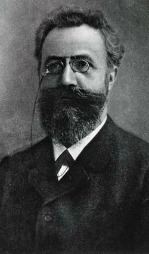David Webb's Blog, page 2
January 29, 2015
Gordon Allport The Nature of Prejudice: Today in the History of Psychology (29th January 1954)

Gordon Allport's classic book 'The Nature of Prejudice' was published. Based on years of exhaustive research this landmark text documented groundbreaking insights into the origins and nature of discrimination. Among the many topics addressed by Allport were: Formation of in-groups, the scientific study of group differences, cognition in the prejudiced personality, scapegoating and stereotypes.
The Nature of Prejudice remains one of the most influential and critically acclaimed publications on intergroup relations ever written; as evidenced by the words of eminent psychologist Elliot Aronson who stated that Allport "carefully chose among existing theories and data to come up with a brilliant and accurate statement of the eclectic causes and possible cures of prejudice."
Published on January 29, 2015 05:48
January 28, 2015
Florence Denmark: Today in the History of Psychology (28th January 1932)

Florence Denmark was born. A pioneering and internationally renowned teacher, author and speaker on the psychology of women, Florence Denmark has conducted groundbreaking research on a range of topics including, violence, prejudice and stereotyping, ethnicity and gender.
Among her many professional achievements, Florence Denmark was a founding member of the Association for Women in Psychology in 1969, was the American Psychological Association (APA) president in 1980, received the APA Award for Distinguished Contributions to Psychology in the Public Interest in 1992 and in recent years served as the leading representative to the United Nations for both the International Council of Psychologists and the American Psychological Association.
Published on January 28, 2015 03:48
January 27, 2015
James Gibson: Today in the History of Psychology (27th January 1904)

James Jerome Gibson was born. One of the most eminent figures in the history of perceptual psychology, Gibson is renowned for his ecologically driven metatheory which contends that information informing our perceptual understanding of the world is sensed directly through our interaction with the environment.
In a career spanning six decades, 'The Perception of the Visual World' (1950), 'The Senses Considered as Perceptual Systems' (1966) and 'The Ecological Approach to Visual Perception' (1979), rank among Gibson's most important publications.
Professionally recognized throughout his working life, Gibson was awarded the Howard Crosby Warren Medal from the Society of Experimental Psychologists in 1952, received the American Psychological Association Award for Distinguished Scientific Contributions in 1961, and was elected to the National Academy of Sciences in 1967.
Published on January 27, 2015 03:14
January 26, 2015
Marie Jahoda: Today in the History of Psychology (26th January 1907)

Marie Jahoda was born. An eminent social psychologist, Jahoda conducted pioneering studies into racial prejudice, the authoritarian personality and the concept of positive mental health. Along with her first husband Paul Lazarsfeld, Jahoda also carried out groundbreaking research on the psychological impact of unemployment; culminating in 1933 with the publication of their seminal work on the subject, 'Marienthal: The Sociography of an Unemployed Community,' a social psychology classic.
In 1979 Marie Jahoda received the American Psychological Association (APA) Award for Distinguished Contributions to Psychology in the Public Interest and in 1980 was the recipient of the prestigious (APA) Kurt Lewin Award, presented for 'outstanding contributions to the development and integration of psychological research and social action.'
Published on January 26, 2015 06:06
January 25, 2015
Molly Harrower: Today in the History of Psychology (25th January 1906)

Molly Harrower was born. A pioneering clinical psychologist, Harrower spent the early part of her career working alongside Kurt Koffka where she was immersed in the field of experimental Gestalt psychology, publishing several influential articles on color perception.
Molly Harrower is best known; however, for her contribution to psychodiagnostic testing, particularly her work on the development and applied use of group Rorschach tests. Her books 'Large Scale Rorschach Techniques: A Manual For The Group Rorschach and Multiple Choice Test (1945)' and 'Psychodiagnostic Testing: An Empirical Approach (1965)' rank among her most important published works.
Published on January 25, 2015 04:51
January 24, 2015
Hermann Ebbinghaus: Today in the History of Psychology (24th January 1850)

Hermann Ebbinghaus was born. A pioneer in the scientific study of memory, Ebbinghaus is best known was his landmark work 'Über das Gedächtnis' first published in 1885 and later translated into English under the title 'Memory: A Contribution to Experimental Psychology' in 1913.
Drawing upon innovative quantitative measures, most notably nonsense syllables; this classic book by Ebbinghaus investigated several aspects of memory, including learning, retention, association and reproduction and introduced a series of enduring concepts such as the learning curve, the forgetting curve and the spacing effect.
Published on January 24, 2015 06:41
January 23, 2015
Floyd Allport Social Psychology: Today in the History of Psychology (23rd January 1924)

Floyd Allport's groundbreaking book 'Social Psychology' was published. Drawing upon experimental methods and applied research to study group process, rather than sociological perspectives which had previously dominated the subject; this discipline defining book was instrumental in establishing social psychology as a legitimate field of scientific interest.
Notable chapters within the book include: The Physiological Basis of Human Behavior, The Nature and Development of Social Behavior, The Measurement of Personality, Social Stimulation: Facial and Bodily Expression and Social Attitudes and Social Consciousness.
Published on January 23, 2015 05:12
January 22, 2015
Francis Bacon: Today in the History of Psychology (22nd January 1561)

Francis Bacon was born. An eminent polymath and celebrated thinker, Bacon pioneered and championed empirical and inductive methods of inquiry, the fundamental basis of all modern science; including experimental psychology and psychological science.
Among his most influential work was Novum Organum Scientiarum (new instrument of science) published in 1620 which promoted the view that real world evidence must be acquired in the pursuit of truth and knowledge.
Published on January 22, 2015 05:14
January 21, 2015
The Psychopath: Today in the History of Psychology (21st January 1885)

The Pall Mall Gazette publishes the first recognized account of the term psychopath as we understand it today. Reporting on the acquittal of a Russian woman in a child murder case, the Gazette points to the testimony of Dr. M. Balinsky as being central to the verdict in the case, having informed the jury that the accused was suffering from "psychopathy," and therefore morally irresponsible.
In explaining this "new malady" Dr. Balinsky is quoted as saying that the psychopath "is an individual whose every moral faculty appears to be of the normal equilibrium. He thinks logically, he distinguishes good and evil, and he acts according to reason. But of all moral notions he is entirely devoid. Beside his own person and his own interests, nothing is sacred to the psychopath."
Published on January 21, 2015 05:58
January 20, 2015
The Insanity Defense: Today in the History of Psychology (20th January 1843)

Daniel M'Naghten shot and killed Edmund Drummond the private secretary of British Prime Minister Sir Robert Peel; mistakenly thinking Drummond was Peel, his intended target.
In a landmark legal ruling M'Naghten was found not guilty of murder on the grounds that his delusional mental state rendered him incapable of knowing that what he was doing was wrong. This enduring legal precedent within the insanity defense became known as the 'The M'Naghten Rules.'
(Note: The correct spelling of M'Naghten's surname is the subject of much debate and is sometimes documented as McNaughton, McNaughten or McNaughtan.)
Published on January 20, 2015 06:10



